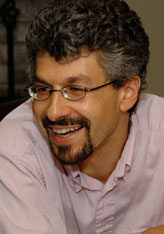Jonathan H. Marks
 |
Affiliate Law Faculty Professor of Bioethics, Humanities and Law Location: University Park
|
About Marks
Jonathan H. Marks is director of the Bioethics Program at Penn State University. He is also affiliate faculty with Penn State Law and School of International Affairs. In 2009-2010, Professor Marks was the Edmond J. Safra Faculty Fellow in Ethics at Harvard University — where he remained affiliated with the ethics center throughout its six-year initiative on Institutional Corruption (2009-2015).
Marks is also a barrister and academic member of Matrix Chambers, London. While in full-time legal practice, Marks was counsel for Human Rights Watch in the Pinochet case. He also represented a Canadian physician in a leading case on pharmaceutical regulation in the European Court of Justice; and he argued a case on privacy and data protection that changed electoral practice in England and Wales. He is currently serving as a consultant to core participants in the UK COVID Inquiry.
An expert working at the intersections of human rights law, bioethics, and public health policy, Professor Marks has written for journals of law, medicine, bioethics, and public health. He has also written for broader audiences in venues such as The Times (London), the New York Times, LA Times, and the Harvard ethics blog.
Professor Marks has participated in nationally broadcast panels and radio shows on law and medical ethics at Guantanamo Bay and other detention centers. In recent years, he has participated as an expert in several policy meetings on public-private partnerships — including workshops held under the auspices of the National Academies in Washington, D.C., and the World Health Organization in Geneva.
Publications
“War Profiteers and Peace Brokers: The Responsibilities of Third Parties in Armed Conflict,” American Journal of Bioethics (forthcoming, Spring 2025)
“The Art of Fiction: Neocolonialism, Narrative Redress, and International Law,” Temple International & Comparative Law Journal, 38(2): 103-116 (2024)
“Trust in Crises and Crises of Trust,” Hastings Center Report, 53(5): S9 – S15 (2023)
“COVID-19, Pandemic Triage, and the Polymorphism of Justice,” American Journal of Bioethics, 20(7): 106 – 109 (2020)
“Beyond Disclosure: Developing Law and Policy to Tackle Corporate Influence,” American Journal of Law and Medicine, 46: 275 – 296 (2020)
“Learning from Corporate Influence in the Opioid Epidemic: Toward a Norm of Separation,” Journal of Bioethical Inquiry, 17(2): 173 – 189 (2020)
“The Perils of Partnership: Industry Influence, Institutional Integrity, and Public Health,” Oxford University Press (2019)
“Are Corporations Nudging the Nudgers?” American Journal of Bioethics, 19(5): 70 – 72 (2019).
“Which Will Trump: Professional Ethics and Human Rights, or Torture Redux?” Medicine, Conflict, and Survival, 33(1): 4 – 17 (2017).
“Caveat Partner: Sharing Responsibility for Health with the Food Industry?” American Journal of Public Health, 107(3): 360-361 (2017)
“The Ethics of Compromise: Third Party, Public Health, and Environmental Perspectives, Journal of Medical Ethics, 43: 267-268 (2017)
“Silencing Marcellus: When the Law Fractures Public Health,” Hastings Center Report, 44(2): 8-10 (2014)
“Toward a Systemic Ethics of Public-Private Partnerships Related to Food and Health” Kennedy Institute of Ethics Journal, 24(3): 267–299 (2014)
“The Undocumented Unwell,” Hastings Center Report, 43(1): 10-11 (2013)
“Toward a Unified Theory of Professional Ethics and Human Rights,” Michigan Journal of Internnational Law, 33: 215-263 (2012)
“On Regularity and Regulation, Health Claims and Hype,” Hastings Center Report, 41(4): 11-12 (2012).
“A Neuroskeptic’s Guide to Neuroethics and National Security,” American Journal of Bioethics: Neuroscience, 1(2): 4 - 12 (2010)
The Terrorist and the Doctor: A Legal and Ethical Response, 9 Am. J. Bioethics 49 (2009)
The Ethics of Interrogation — The U.S. Military’s Ongoing Use of Psychiatrists, 359 ;New Eng. J. Med. 1090 (2008) (with M. Gregg Bloche)
Interrogational Neuro-imaging: A ‘No-Brainer’ or a Human Rights Hazard? 37 Am. J. Law & Medicine 483 (2007) (Special Peer-Reviewed Symposium Issue)
Doctors as Pawns? Law and Medical Ethics at Guantanamo Bay, 37 Seton Hall L. Rev. 711 (2007) (Guantanamo Symposium Issue); reprinted in Almerindo Ojeda, The Trauma of Psychological Torture (2008) and R. Satyanarayana, Professional Privileges and Judicial Approach (2009)
9/11 + 3/11 + 7/7 = ? What Counts in Counterterrorism, 37 Colum. Hum. Rts. L. Rev. 559 - 626 (2006)
Mending the Web: Universal Jurisdiction, Humanitarian Intervention and the Abrogation of Immunity by the Security Council, 42 Colum. J. Transnat’l L. 445 - 490 (2004) (selected by Foreign Policy magazine in its global review, July 2004)
News
Affiliate faculty member Jonathan Marks named a Hastings Center fellow
Jonathan Marks gives TEDxPSU talk on the ethics of crisis management

 814-865-5938
814-865-5938